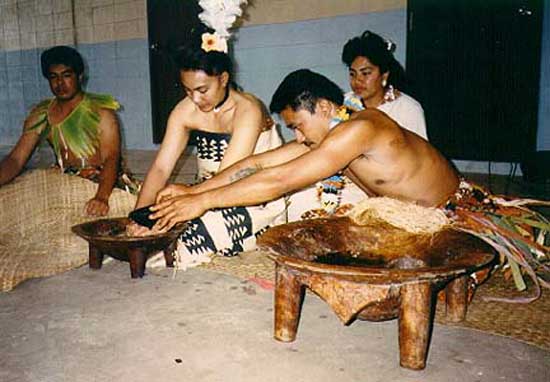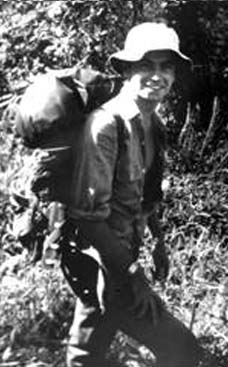
Tongan children want to say hello and be noticed. The bolder among them will come closer, offering a flower, wanting to touch, smiling with all the innocence of childhood and the eagerness of a culture that reveres visitors from abroad as something special. The day my training group arrived on Eua where we would spend the next six weeks in home stay, we went first to a village hall to wait for our “families” to come after us. We arrived there just as the primary school was dismissed for the day and a giggling troop of children in red and tan uniforms gathered outside the hall waving at us. Several of the volunteers hauled out their cameras and we quickly found out the second thing that Tongan children love to do when strangers arrive – strangers with cameras, that is! They LOVE to have their photos taken and they push and shove to be closest to the camera with their hands held up in what looks like sign language for I love you, but might have meant almost anything. If you have a digital camera, you’ll quickly be swarmed as they will crowd around to see themselves on the tiny screen.
Skye Taylor writes:The Children of Tonga
The Children of Tonga
By Skye Taylor
The sound of giggling children has as much universal appeal as their innocent zest for life. And yet, there are special differences that tug at the heart wherever one goes. In Tonga, the first thing you notice are the big brown eyes full of curiosity and friendliness and piping voices calling out “bye bye,” or “Palangi.”
For many, Bye bye is the only word of English they know, and as often as not they don’t even know what it means. It’s just the standard greeting when they see a foreigner. The other word you hear called out to you in the streets and over an expanse of packed dirt that separates a doorway from the street is “Palangi.” Unless they know you personally, you can expect to hear yourself called this everywhere you go, with the emphasis on the long E sound at the end (pa-laang-eeeee).
Tongan children want to say hello and be noticed. The bolder among them will come closer, offering a flower, wanting to touch, smiling with all the innocence of childhood and the eagerness of a culture that reveres visitors from abroad as something special. The day my training group arrived on Eua where we would spend the next six weeks in home stay, we went first to a village hall to wait for our “families” to come after us. We arrived there just as the primary school was dismissed for the day and a giggling troop of children in red and tan uniforms gathered outside the hall waving at us. Several of the volunteers hauled out their cameras and we quickly found out the second thing that Tongan children love to do when strangers arrive – strangers with cameras, that is! They LOVE to have their photos taken and they push and shove to be closest to the camera with their hands held up in what looks like sign language for I love you, but might have meant almost anything. If you have a digital camera, you’ll quickly be swarmed as they will crowd around to see themselves on the tiny screen.
On the hunt for a permanent home, I visited a village that I thought promising and as I walked about the dusty streets I was hailed by a young girl I’d met at the library where I’d become part of the Saturday Story Hour. Her English was quite good and she eagerly joined me asking me where I was going, then appointed herself as my guide and showed me all about her village. The Village Noble’s house was pointed out and much admired, as well as the beach and the cemetery. We met another girl from the library who was carrying a puppy that we played with before going on and finally, I was taken to her home to be introduced to her family. Before I left, I was presented with a fan she wanted very much to honor me with. It wasn’t a new fan, but it was decorated with red feathers which I later learned meant it was a very special possession and I was touched by her generosity.
There were three children in the family that offered to share their home with me. Silivia was a beautiful girl – exactly what you picture when you think of Polynesia, with dark eyes and long black hair. She was as graceful as she was lovely and danced with a maturity way beyond her years. She became a self appointed translator and coached me in the Tongan language as well as the culture. Sione loved to sing and play the drums as much as he enjoyed the rough and tumble of boys everywhere. He preferred to pretend he didn’t understand my English even after I’d been there almost two years, but he understood enough to play pranks and share a joke. Then there was Sitefani.
Sitefani was only four when I came to live with them and because both her parents worked, she spent her weekdays in a remote village with her grandmother. The first Friday in my new home, I was sitting on the veranda reading when the car arrived bringing her home for the weekend. Sitefani lingered behind the open car door for several minutes before gathering the courage to approach the house. Then she hugged the post at the corner of the veranda. I spoke to her in Tongan and she smiled shyly and moved one post closer eyeing me cautiously until my eyes returned to my book. Out of the corner of my eye, I saw her creep carefully closer until she was at the edge of my bench, then sitting on the far corner. In just a few more minutes, she was leaning against my arm, her big brown eyes gazing up and me and a lovely friendship was born.
The route to the Red Cross building where I worked passed the high school and the lane leading to the primary school in my village and it was a rare day that I walked home from work without being accompanied by at least one child. Often my companions would be children who lived near me and who I knew, but just as often they were youth I’d never met. If they saw me coming down the short cut from my office they would hail me, calling out “tatali” or “tali tali” (wait) but not knowing any English, became mute when we finally met and began the trek toward home. My Tongan was getting better but I was a slow learner and often I think my accent so bad they didn’t understand my efforts to engage them in their own language. But as time went on and my both my vocabulary and theirs grew the conversations became quite lively.
Among the kaleidoscope of memories of the children of Tonga that remain vivid in my mind are the three little boys next door who loved to frolic naked in the rain, the shy little boy who presented me with a papaya he’d picked himself to welcome be to his village, a half dozen high school boys tearing down the pier at lunch time, shucking their school uniforms and leaping, short-clad, into the harbor to cool off, five year olds crowding around me as I read to them, one of whom who always managed to end up sitting in my lap, a teenaged boy who brought his baby sister to church every Sunday and sat cross-legged with her in his lap for the entire mass, the 16 year old who wept unashamedly on my shoulder at his mother’s funeral, the girl I tutored crowing with delight as she trounced me at the game of concentration, and the delight of the neighborhood children when I introduced them to water balloon fights.
Shortly before I left, the primary school participated in a “Character Parade” where each student dressed up as one of the characters from a book he or she had read in English. The students asked anxiously if I was coming to their parade on the last day I taught at their school and I assured them I wouldn’t miss it for anything. The day of the parade, I was at the post office shipping a package home when I heard the band coming down main street. There is no hurrying a Tongan and the postal clerks are no exception, so I was getting anxious to be done with my transaction. By the time I finally finished and dashed outside, the parade had turned the corner, but I knew a shortcut to the route they would be on and hurried to get to the next cross-road before they arrived. The high school band led the parade as they approached and it was a moment or two before the first students noticed me standing on the corner. They shouted my name and waved at me as if I were a celebrity. As they passed, posing for my camera, still calling out to me and grinning with pleasure that I had come to their parade I felt truly honored to have shared a small part of their lives. It still seems amazing to me that I should have come unbidden into their lives and been so generously welcomed, or meant enough to them to be so warmly hailed before I left.













